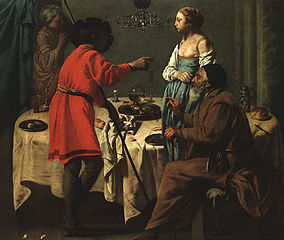 “The mark of an educated mind,” taught Aristotle, is “to be able to entertain a thought without accepting it.” And that’s what I’ll be asking of you today. Because as certain as I am that I’m substantially right on this, I’m also sure that its acceptance will take time. But I do want to plant its seeds as best I can.
“The mark of an educated mind,” taught Aristotle, is “to be able to entertain a thought without accepting it.” And that’s what I’ll be asking of you today. Because as certain as I am that I’m substantially right on this, I’m also sure that its acceptance will take time. But I do want to plant its seeds as best I can.
The Cult… Is Us
Doubtless you’ve seen or heard stories about religious cults and the people born into them. They all focus upon the same set of writings and explanations, all repeat the same phrases, and all approve or disapprove of the same things.
If you’re inside such a structure, it makes sense and holds together. Stepping outside the structure, however… that becomes terrifying.
And so I’ll ask you to think, please, of the place rules hold in our world. They are everywhere. They are everything. No one would try to imagine anything else. Rules are, were, and ever shall be. Only a crazy person would think otherwise.
And so the walls of our cult stand, and it is we who maintain them.
What Rules Are
Rules are edicts, not processes. They’re mechanical, not organic. They are binary, not broad or rich.
Rules do not envision thought; they envision only the polarized termini of obedience and disobedience. Rules do not open space for the consideration of principles and possibilities; they open only enough space for orthodoxy or heresy.
Obedience and cognition are opposing models of human behavior.
Rules demand that we abdicate our personal will.
Is There Anything Else?
Having rules inculcated into us – being immersed in them life-long – we see nothing else, imagine nothing else, and expect nothing else. And yet…
Limits can be enforced perfectly well without rules. The impetus behind this type of enforcement, however, must be willful and personal. That is, we each choose to enforce limits based upon our own determinations. For example:
- Informing your neighbors that Bob has stolen from you and warning them to be careful.
- Refusing to do business with someone who behaves especially badly.
- Putting a note on the car of someone who endangers others by driving recklessly. Then putting a “boot” on the car if the endangerment continues.
- Shooting a killer or rapist in the act.
We’re all afraid of these things, because acting on our own leaves us unprotected from responsibility and shame. Inside the cult, accepting responsibility is worse than abdicating our minds and wills. We instantly imagine all the ways it could go wrong: The bad guy will shoot me, people will ridicule me, I’ll be embarrassed forever, my spouse will dump me, and so on. We imagine all of the worst and none of the positive. The cult is fighting to keep us within. Balance and proportion are non-players.
And yet, all the examples above show limits being enforced without resorting to rules… by using our wills rather than abdicating major functions of them.
All Be Monsters?
What is excluded from consideration is that most people are basically decent. Sure, they’re also somewhat variable, having better and worse moments, but generally, they’re pretty decent. What percentage of drivers, for example, deviate from the “basically okay” model?
I strongly suggest that the next time you’re a passenger in a car, you start counting basically okay drivers and dangerous drivers.
On a real-world, average basis, I’ll bet that 95% of people (on the street, in offices, etc.) are basically decent.
So, are we really afraid of situations where 19 of 20 people are exercising their will toward the good? Is that automatically more frightening than rules which are written by the corrupt and enforced by only one person in every several hundred… a person who may be equally corrupt?
And how much better might the world be if people habitually used their minds and wills, rather than turning them off? This is a question you may want to hold in the back of your mind. I don’t have a statistical answer for you, but I’m confident the difference would be very large.
A sea of active minds, a web of active will toward the good… these are beneficial things that rules forbid.
Last Words
I think I’ve made my point fairly well, but since the cult of rules is so very pervasive, I’ll restate the core of this once more, again asking you to allow it to remain in your mind as a possibility, however unlikely:
Enthroning rules as unquestionable, and life without them unimaginable, we have turned off important functions of our minds; we have deactivated important functions of our wills… functions that are essential for birthing life and goodness into the world.
**
Paul Rosenberg
freemansperspective.com
